Russia-Ukraine War News: Crimea Bridge Destroyed in ...
Russia-Ukraine WarExplosion Damages Crimea Bridge, Imperiling Russian Supply Route
-
Give this article
-
CrimeaAgence France-Presse — Getty Images
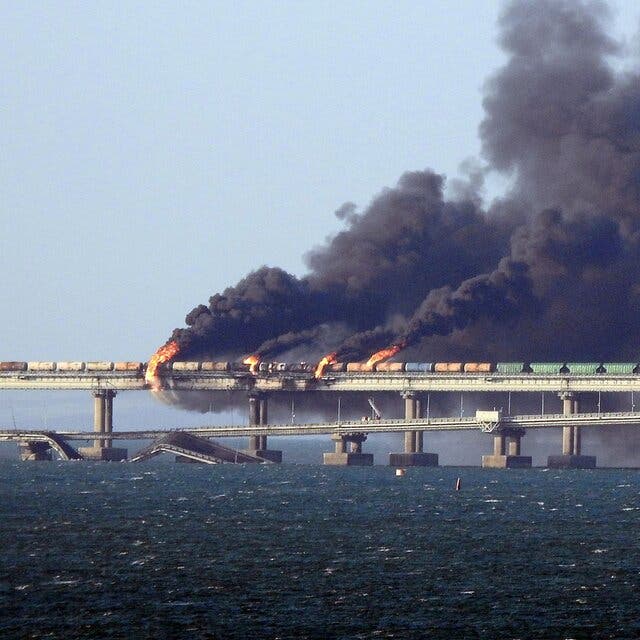
-
Velyka OleksandrivkaNicole Tung for The New York Times
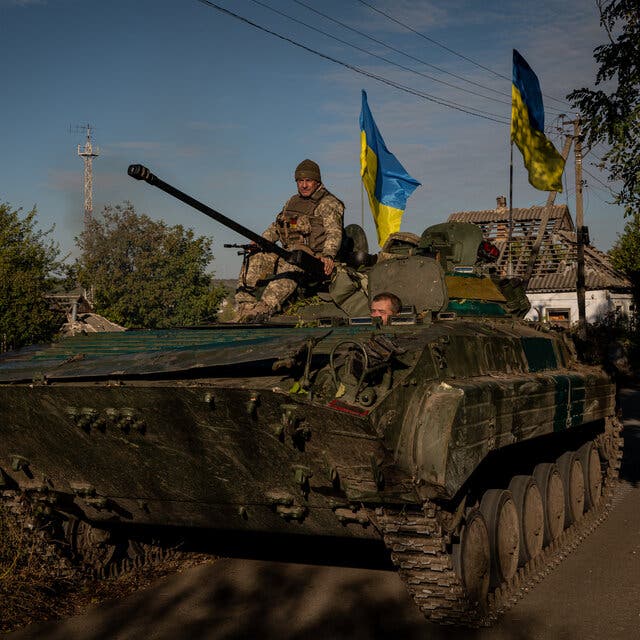
Here’s what we know:
Part of the crossing, the sole bridge linking the Crimean Peninsula with Russia, collapsed into the sea.
The bridge linking Crimea with Russia is damaged by fire after an explosion.
Crimea’s Kerch Strait Bridge holds deep strategic, and symbolic, value.
The Crimea bridge explosion prompts calls for revenge from Russian hard-liners.
Kharkiv is hit with overnight explosions.
Russian shelling has again forced the Zaporizhzhia nuclear plant offline, Ukrainian officials say.
A mass grave and a separate burial site with nearly 200 bodies are discovered in Lyman.
The I.M.F. said $1.3 billion in emergency funding for Ukraine had been approved by its board.
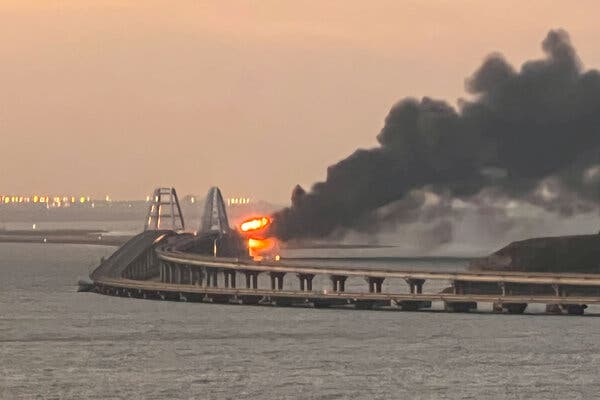
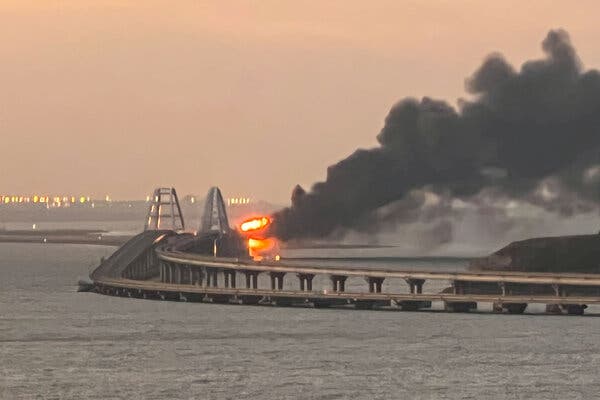
KRYVYI RIH, Ukraine — An explosion tore through the sole bridge linking the Russian-occupied Crimean Peninsula to Russia, collapsing a part of the span into the sea and imperiling a primary supply route for Russian troops fighting in the south of Ukraine.
The 12-mile-long Kerch Strait Bridge is a cherished political project of President Vladimir V. Putin and had become a potent symbol of the claims that Mr. Putin makes to the peninsula, which his forces illegally seized from Ukraine in 2014. Mr. Putin presided over the opening of the bridge in 2018, personally driving a truck across.
The extent of the damage was difficult to immediately assess, though any impediment to traffic on the bridge could have a profound effect on Russia’s ability to wage war in southern Ukraine. Videos showed the railroad burning and two of four lanes of roadway collapsed into the Black Sea, where waves lapped the asphalt.
The Russian Railways company said all trains to and from Crimea have been temporarily canceled, the state news agency Tass reported.
The bridge is the principal military supply route linking Russia with the Crimean Peninsula. Without it, the Russian military will be severely limited in its ability to bring fuel, equipment and ammunition to its units fighting an increasingly intense battle for the control of southern Ukraine. Russia still controls roads on overland routes from Russia into southern Ukraine, but those are within range of Ukrainian rocket artillery.
The peninsula also holds special meaning for Mr. Putin, who has told his people that Crimea is a “sacred place” and Russia’s “holy land.”
Russia’s National Anti-Terrorism Committee said in a statement that a truck had exploded on the bridge, igniting seven fuel cisterns being pulled by train on a parallel railroad crossing headed in the direction of Crimea and causing two car spans to partially collapse. Preliminary information suggested that three people were killed, Russia’s investigative committee said in a statement.
While there were no immediate claims of responsibility, Russian and Ukrainian officials indicated that the fire was no accident.
The Kremlin’s spokesman, Dmitri S. Peskov, referred to the episode as an “emergency” in a statement on Saturday, without assessing who was behind it. He said that Mr. Putin, who had celebrated his 70th birthday on Friday, had been briefed.
“The president directed the prime minister to form a government commission to find out the causes of the incident and eliminate the consequences as soon as possible,” Mr. Peskov said, according to Russian state media.
Occupation officials in Crimea left little doubt about who they thought was responsible.
“Ukrainian vandals were able to reach the Crimean bridge with their bloody hands,” said Vladimir Konstantinov, the head of Crimea’s Kremlin-installed Parliament. Multiple Ukrainian officials and government agencies hinted, often slyly, that Ukraine was responsible. Since early in the war, Kyiv has maintained a policy of ambiguity on attacks targeting Russian territory and some strikes on occupied land.
“Crimea, the bridge, the beginning,” Mykhailo Podolyak, an adviser to Ukraine’s president, wrote on Twitter. “Everything illegal, must be destroyed. Everything stolen returned to Ukraine.”
In a wink at claiming credit, the Security Service of Ukraine, known by its Ukrainian acronym S.B.U., issued a statement as a rephrased stanza of a poem by the country’s national poet, Taras Shevchenko. “Dawn, the bridge is burning beautifully,” the agency posted on Twitter. “A nightingale in Crimea meets the S.B.U.”
A senior Ukrainian military official did not deny that Ukrainian forces were behind the attack but would not confirm it.
“All I can say is that an echelon with fuel intended to supply occupation forces in the south of Ukraine was passing over the bridge,” the official said, speaking on the condition of anonymity because he did not have permission to speak to the news media.
As a symbol of Mr. Putin’s claim on Ukrainian land, the bridge has been tightly bound with the Russian president’s political messaging at home. Its partial destruction, however, could play into Mr. Putin’s claims that Russia is under attack from a Western-armed Ukraine and help tamp down domestic opposition to Russia’s first wartime draft since World War II. Ukrainian officials have said they worried hitting the bridge could galvanize Russian support for the war.
In recent weeks, military traffic heading across the bridge into Crimea has increased as Russia has raced tanks and artillery equipment to the front lines in the Kherson Region, which has been a focus of Ukraine’s counteroffensive against the Russian army. Russian troops have been in retreat, abandoning towns and villages and falling back toward the regional capital, Kherson.
Maria Varenikova contributed reporting from Kryvyi Rih, Ukraine.
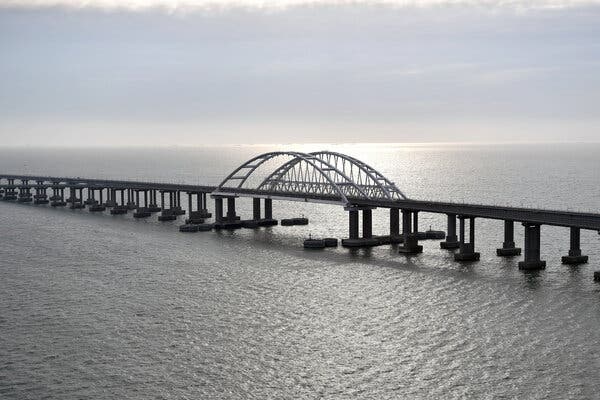
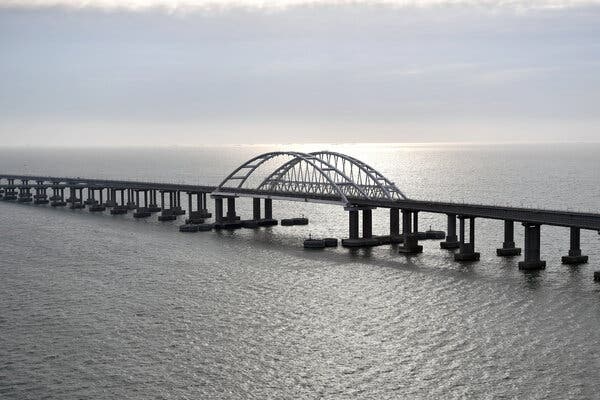
The 12-mile Kerch Strait Bridge linking the Crimean Peninsula to Russia, which was badly damaged by an explosion on Saturday, is not just the primary supply route for Moscow’s forces fighting in southern Ukraine. It is also deeply symbolic for President Vladimir V. Putin of Russia, a pillar of his disputed claim to the Crimean Peninsula since the completion of the twin road spans in 2018.
Mr. Putin presided over the bridge’s opening, personally driving a truck across what is a physical link between Russia and Crimea — land that Mr. Putin seized from Ukraine in 2014 and annexed to international outcry.
Ukrainians loathe the bridge, whose symbolism and strategic importance for resupply has long made it a potential target. Over the summer, the Ukrainian military posted a taunting image on Twitter threatening to strike it with American-provided guided rockets. The video showed the launch vehicle, a High Mobility Artillery Rocket system, floating on a pink inflatable pool raft in the strait, and the bridge in the background.
And at one point over the summer, it appeared to have been targeted: Russian officials said that a drone had triggered air defense systems. The Ukrainian government had no official comment at the time.
The damage to the bridge could sever the single overland route to bring supplies from Russia to its bases in Crimea.
Moscow had stepped up countermeasures to defend the structure, deploying a target ship — replete with an array of radar reflectors — to protect the bridge from attack and running drills to cover the bridge with a smoke screen.
As well as military value, the structure holds deep symbolic significance for the Kremlin. After illegally annexing Crimea in 2014, Moscow vowed to physically connect the peninsula to Russia.
For a century, talks of building a bridge across the strait — which runs between two mountain ranges, creating a fierce wind tunnel — had failed to result in action. But Mr. Putin put his weight behind the project, despite that and other engineering challenges, which include a seabed covered with some 250 feet of fine silt deposited by the alluvial flow from various rivers.
During World War II, an ice floe unleashed during the spring thaw toppled a German military bridge that been hastily constructed across the waters to aid the Nazi war effort.
In 2018, when the new bridge was opened, Mr. Putin hailed it a “remarkable” achievement that, he said, referring to a major city on the peninsula, “makes Crimea and legendary Sevastopol even stronger, and all of us are even closer to each other.”
But after explosions at the Saki airfield on Crimea in August, the bridge served a different purpose: It was a quick escape route as the war came to the peninsula, with more than 38,000 cars crossing in one day, the most recorded since Mr. Putin declared it open.
The State of the War
- Russia’s Retreat: After significant gains in eastern cities like Lyman, Ukraine is pushing farther into Russian-held territory in the south, expanding its campaign as Moscow struggles to mount a response and hold the line. The Ukrainian victories came as President Vladimir V. Putin of Russia illegally annexed four regions where fighting is raging.
- Dugina Assassination: U.S. intelligence agencies believe parts of the Ukrainian government authorized the car bomb attack near Moscow in August that killed Daria Dugina, the daughter of a prominent Russian nationalist. American officials said they were not aware of the plan ahead of time and that they had admonished Ukraine over it.
- Oil Supply Cuts: Saudi Arabia and Russia, acting as leaders of the OPEC Plus energy cartel, agreed to a large production cut in a bid to raise prices, countering efforts by the United States and Europe to constrain the oil revenue Moscow is using to pay for its war in Ukraine.
- Putin’s Nuclear Threats: For the first time since the Cuban Missile Crisis in 1962, top Russian leaders are making explicit nuclear threats and officials in Washington are gaming out scenarios should Mr. Putin decide to use a tactical nuclear weapon.
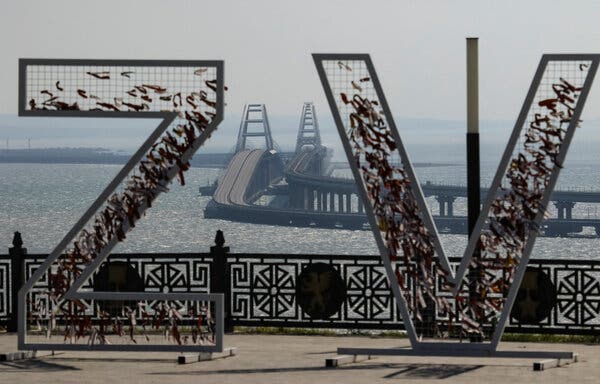
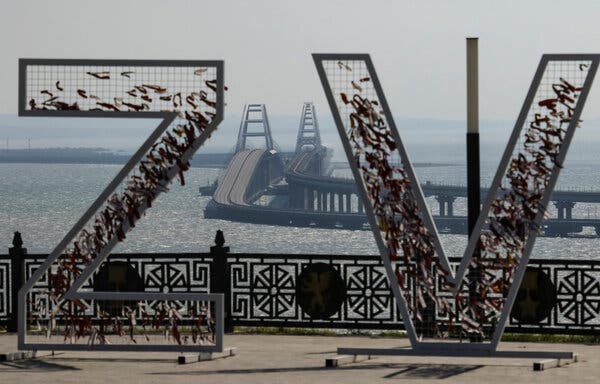
Russian hard-liners reacted with surprise and frustration to the calamitous explosion on the Kerch Strait Bridge on Saturday, calling yet again for Russia to escalate its attacks on Ukraine.
President Vladimir V. Putin has faced heightened pressure in recent weeks with harsh criticism of military leaders from some of his closest, hawkish allies, and the explosion on the bridge was likely to add to accusations of incompetency swirling around the Kremlin’s entire Ukraine war effort.
Ukrainian officials have hinted that Ukraine was responsible for Saturday’s explosion.
Aleksandr Kots, a war correspondent for the Russian tabloid Komsomolskaya Pravda, wrote on Telegram that disabling the bridge bodes ill for Moscow’s already troubled efforts to hold onto territory in the Kherson region of southern Ukraine — and likely foreshadowed a future attack on Crimea itself.
He described the “consistency” that Ukraine was showing in the war as “enviable” and called for Russia to “hammer Ukraine into the 18th century, without meaningless reflection on how this will affect the civilian population.”
Many commentators demanded that Russia destroy Ukraine’s electricity infrastructure and the transportation systems used to import Western armaments.
Another war correspondent, Evgeny Poddubny, writing for the state RT outlet, said that nobody in the Ukrainian leadership seemed to fear Russia anymore.
“The enemy has stopped being afraid, and this circumstance needs to be corrected promptly,” he wrote in RT’s Telegram channel. “Commanders of formations, heads of intelligence agencies, politicians of the Kyiv criminal regime sleep peacefully, wake up without a headache and in a good mood, without a sense of inevitability of punishment for crimes committed.”
Russia should also revive Mr. Putin’s formula for winning the Chechen war more two decades ago when he vowed to pursue adversaries relentlessly — and even “waste them in the outhouse,” the post said.
At least at first, the attack did not incite more of the intense criticism focused in recent weeks on the Defense Ministry and the minister himself, Sergei K. Shoigu.
But the $7 billion, 12-mile-long bridge was a symbolic and engineering triumph for Mr. Putin. Completed in 2018, it literally cemented Russia’s claim to make Crimea part of its territory. Damaging it, as some commentators noted, raised questions about that control — which will most likely force the president to respond in some way.
The official government reaction was to label the explosion on the bridge a “terrorist attack” and to open an official inquiry.
Rybar, a Telegram news and commentary channel with nearly one million followers but whose origins are unclear, urged against criticism of the leadership in response to the blast, saying that such outpourings had been doing “more harm than good.”
The outlet did echo the calls, however, for Russia to destroy Ukraine’s infrastructure.
“We will not say how inaction in this situation will turn out,” Rybar said. “Let’s ask the question: If this is not a reason for really decisive measures, then what is it at all? People demand revenge.”
Oleg Matsnev contributed reporting.
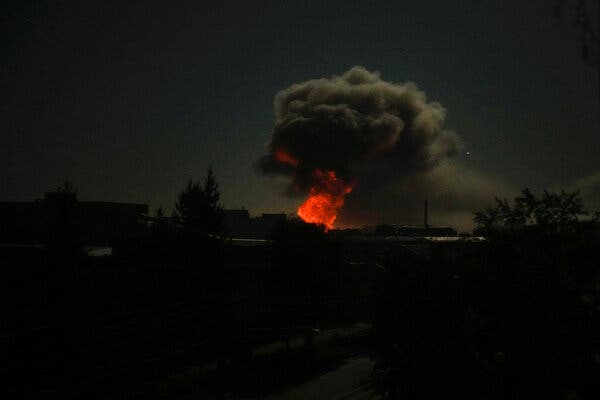
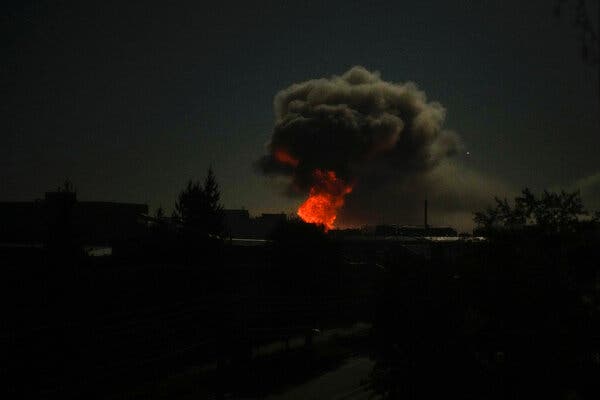
The city of Kharkiv in Ukraine’s northeast was rocked by explosions early Saturday, in what appeared to be the latest indiscriminate attack on civilian infrastructure by Russia.
Photos of an explosion showed a red fireball lighting up the night sky, enveloped by a billowing cloud of dark smoke. Buildings, including a medical institution, were on fire, Kharkiv’s mayor, Igor Terekhov, wrote on Telegram. It was not immediately known whether there were deaths or injuries.
Several towns and cities across Ukraine have been bombarded from the air, as well as with artillery and missile strikes this week, as Moscow’s troops have been forced to retreat across the country. Ukrainian officials and some military analysts said the attacks appeared to signal heightened determination by the Russian military to use its advantage in long-range munitions to exact costs for Moscow’s losses.
Strikes in cities and towns across southern Ukraine, including Zaporizhzhia, Nikopol and Berislav along the Dnipro River, have landed in residential areas and turned apartment blocks to rubble.
At least 22 civilians were killed and 32 injured in Russian attacks in a 24-hour span ending Friday morning, according to a senior official in the office of President Volodymyr Zelensky of Ukraine.
In the northeast, Ukrainian troops have recaptured nearly 500 towns and villages since early September in counterattacks that have pushed Russian forces out of most of Kharkiv Province, which was occupied early in the war. The regional police force said it had recovered more than 500 bodies of civilians and had found sites where it appeared that people had been tortured.
Last month, Mr. Zelensky accused Russia of carrying out “deliberate and cynical strikes” in the region, knocking out critical infrastructure, to avenge Kyiv’s gains.
Ukraine continued its advances, retaking 300 square miles in the country’s east this week, Mr. Zelensky said on Friday in his nightly speech.